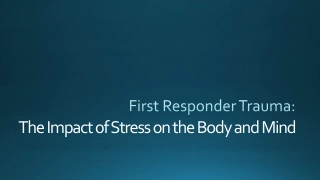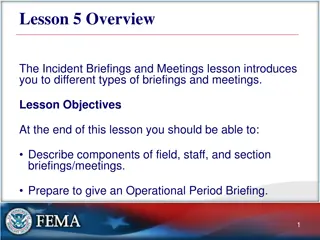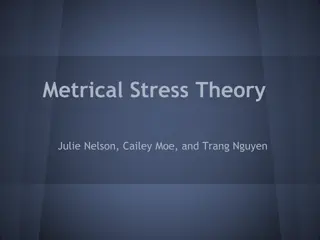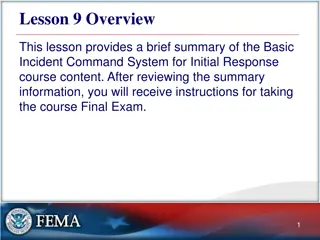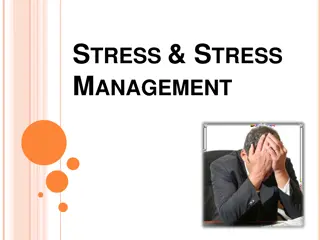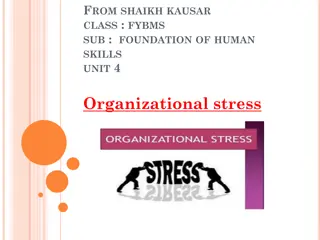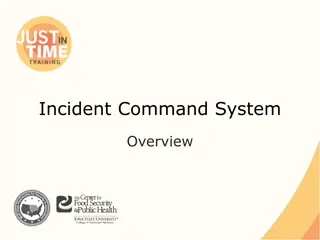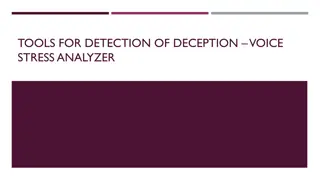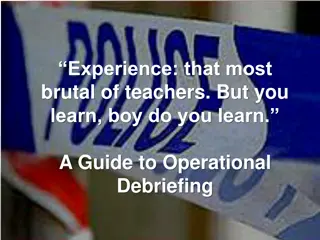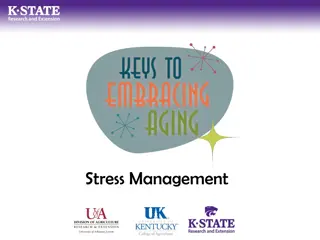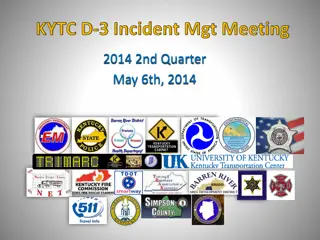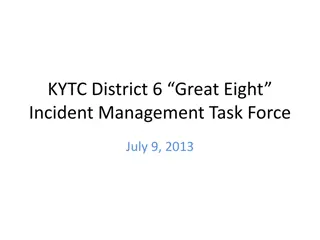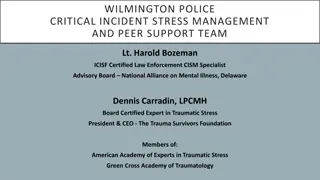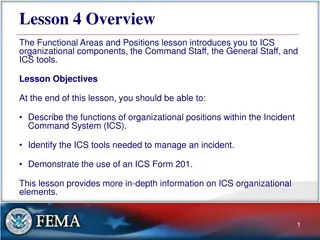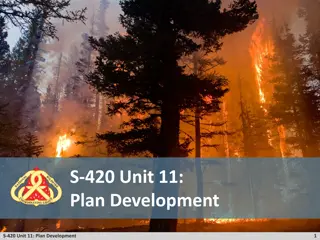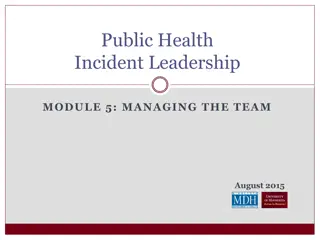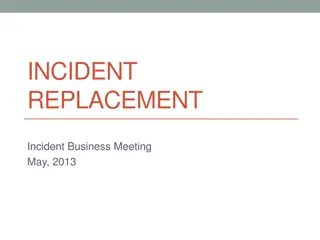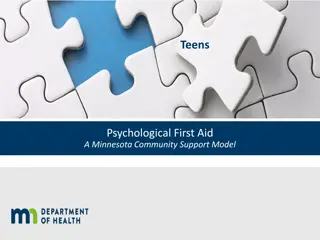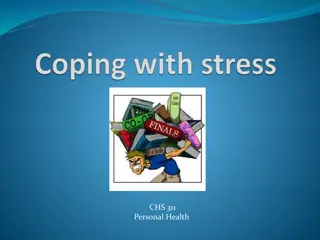Understanding Critical Incident Stress Management (CISM)
Critical Incident Stress Management (CISM) is crucial for addressing the emotional, physical, and psychological reactions to overwhelming events. This includes definitions of critical incidents, CISM teams, peer support, and crisis response teams. Learn how the International Critical Incident Stress Foundation (ICISF) interventions help in stabilizing crisis situations and mitigating symptoms. Discover insights from experts like Jeff Mitchell and George Everly in the field of psychological trauma and disaster mental health.
Download Presentation

Please find below an Image/Link to download the presentation.
The content on the website is provided AS IS for your information and personal use only. It may not be sold, licensed, or shared on other websites without obtaining consent from the author. Download presentation by click this link. If you encounter any issues during the download, it is possible that the publisher has removed the file from their server.
E N D
Presentation Transcript
STRESS MANAGEMENT STRESS MANAGEMENT and and Self Self- -Care Care Len Murray Coordinator Iowa CISM Network murrayl150@hotmail.com (515) 249-9030
EVERYONE IS SUBJECT TO STRESS EVERYONE IS SUBJECT TO STRESS Almost every person has experienced some event that has caused them mental anguish or stress. Natural or Manmade Disaster Loss of a loved one or pet Serious Accident or Injury Strained relationships From birth, we each have developed our own coping mechanisms to address our stress, based on our life experiences and upbringing. Some professions are prone to extreme stresses on a recurring basis. Public Safety, Law Enforcement, Fire Rescue, Emergency Medical Services, Emergency Management Hospital Employees, Public Health Services Military Service Others
DEFINITIONS DEFINITIONS Critical Incident: any event or occurrence that results in strong emotional, physical or psychological reactions that overwhelms our normal coping abilities. Critical incidents are often sudden, shocking, and may disrupt our beliefs or sense of control. May involve an event of personal significance such as emotional or physical loss. Critical Incident Stress: is a normal reaction to an abnormal situation. Critical Incident Stress Management (CISM): is an integrated multi- component crisis intervention system used to achieve the goal of crisis stabilization and symptom mitigation.
DEFINITIONS DEFINITIONS CISM Team: consists of mental health professionals and peers trained to provide stress interventions in accordance with the teachings of the Incident Critical Incident Stress Management Foundation (ICISF) courses of Assisting Individuals in Crisis and Group Intervention . Peer Support Team: is an internal agency team whose members must be designated by the head of their agency and have received training to provide emotional and moral support, and counseling for peers. Peer Support Teams should be monitored by a mental health professional. A peer group counselor definition and confidentiality protections are codified in Iowa Code Section 622.10 (9). Crisis Response Team: provides mental health or victim services for individuals and groups involved in traumatic events. They provide counseling or clinical behavioral and mental health services to enhance the recovery of victims, witnesses, neighborhoods and businesses in the aftermath of significant traumatic events.
INTERNATIONAL CRITICAL INCIDENT INTERNATIONAL CRITICAL INCIDENT STRESS FOUNDATION (ICISF) STRESS FOUNDATION (ICISF) ICISF (Model) interventions and processes were developed through the research of Jeff Mitchell and George Everly. Jeffrey T. Mitchell, PhD, CCISM is a Clinical Professor of Emergency Health Services at the University of Maryland in Baltimore County, Maryland and President Emeritus of the International Critical Incident Stress Foundation. George S. Everly, Jr., PhD, CCISM is an award-winning author, researcher, and pioneer in the field of psychological trauma and disaster mental health.
Basics of Stress Management Basics of Stress Management Crisis intervention is a short-term process to help someone in crisis Intended to stabilize and mitigate stress symptoms Support is provided through information and guidance Allows the person to ventilate their thoughts and emotions by telling their story Teaches stress coping skills and provides access to resources Restores a person in crisis to normal functioning or assists in providing a referral to a higher level of care
Relationships Relationships Everyone, especially managers and supervisors, should develop professional relationships with their co-workers to help understand their background, their goals and aspirations, their level of support and to instill a mutually accepted level of trust. These casual conversations should be sincere and ongoing. Your first real conversation with a co-worker should not be in the middle of a professional or personal crisis.
Potential Traumatic Events Professional Personal Serious injury or death of co-worker Co-worker suicide Serious threat to self or others Fatalities or Mass Casualty Incident Natural Disaster or Act of Terrorism * Loss of spouse, child, parent, or sibling * Loss of job, position, or income * Physical pain or severe injury * Serious accident, illness, or medical procedure * Victim or witness to an act of community violence * Domestic Abuse (physical or emotional) * Sexual abuse or rape * Conflicts with co-workers or supervisors * Workplace harassment, intimidation, or violence * Incarceration Prolonged incidents with loss of life Failed rescue attempt Significant child event or death Victim is known to the responder Excessive media coverage
PREPARATION PREPARATION Pre-incident Education Take time to provide initial and annual employee training to: Identify traumatic events employees may experience, Explain potential symptoms of stress that may present, Provide self-care education and actions employees should consider, and Share a list of available resources with direct contact information.
PREPARATION PREPARATION Strategic Planning What actions do we need to consider, when we become aware of a professional or personal critical incident? Theme: What happened, any prevalent concerns expressed? Targets: Who and how many are impacted and need support? Type: What stress interventions are we going to employ? Timing: When and where are we going to provide services? Teams: Who is best trained and experienced to provide services?
INTERVENTIONS INTERVENTIONS Assessment Is a constant ongoing internal process to check on the welfare of our co-workers and the need for interventions. When we become aware of an impactful event that a co- worker(s) may have experienced, we should reach out to them and ask how they are doing and if they would like to talk about their experience, thoughts or emotions. This demonstrates that you care about them and provides an opportunity to provide compassionate care or presence.
ICISF INTERVENTIONS ICISF INTERVENTIONS Individual Crisis Intervention One-On-One Conversation with a trained co-worker (peer) Provided Anytime Anyplace As Needed Professional or Personal Situations Opportunity for assessment, ventilation of thoughts and emotions, stress education, and referral as needed In my experience, Individual Crisis Intervention is the most used intervention
ICISF INTERVENTIONS ICISF INTERVENTIONS Defusing Small groups of like responders exposed to the same event. Provided by two trained peers, generally within 2 hours of the traumatic event, but no later than 8-12 hours. Three Phases; Introduction - Team, Guidelines, Offer individual support afterwards Exploration - Participants share their stories and reactions Information Normalize reactions, Teach stress management techniques 20-30 Minutes in duration Note: Not used in disaster responses or line of duty deaths
ICISF INTERVENTIONS ICISF INTERVENTIONS Critical Incident Stress Debriefing First Responders and Military, with existing relationships, shared history and time together before the incident and responded to same event. Provided by trained mental health professional and peers, generally 48 to 72 hours post event. Seven Phases; Introduction - Team, Guidelines, Offer individual support afterwards Fact Responders share information about their role and actions Thought - First or most prominent thought(s) about the response Reaction - What is causing them the most distress following this call Symptoms - What have they noticed different about themselves post event Teaching - Normalize reactions, teach stress management techniques Re-entry - Answer any questions provide any closing comments Note: Not used for Line of Duty Deaths or Co-worker Suicides
ICISF INTERVENTIONS ICISF INTERVENTIONS Rest Information & Transition Services (RITS) Used only for emergency services and military personnel at the end of the first work cycle Long Duration Events Manmade or Natural Disasters Provided by an authority figure, supported by trained peers, immediately after work teams are released from duty Provide responders an overview of the event, answer questions, teach self-care, provide food, rest and reporting information Peers perform assessments, individual support make recommendations to command 30 Minutes; Information (10 Min), Food and Rest (20 Min) Note: Not used for routine or small events or for the community
Crisis Management Briefing (CMB) Used for first responders and military personnel returning to work large scale, multi-day events Also used for communities or diverse groups experiencing a significant traumatic event such as; residents, businesses, schools, hospitals, government officials Provided by a credible authority, supported by trained peers and mental health professionals after the situation is stabilized or for emergency responders when they are being returned to work a large scale multi-day event Credible Authority provides a factual overview and current status of the event, and answers questions and while trained peers normalize stress reactions, teach self-care, identify available resources. Peers perform assessments, individual support make recommendations to command Duration typically 20 to 45 Minutes May be repeated multiple times at regular intervals or when new information needs to be disseminated
ICISF INTERVENTIONS ICISF INTERVENTIONS Family Crisis Intervention Pre-event education and post event support as needed Families of victims and emergency responders as indicated Full breadth of interventions as assessments indicates needs Pastoral Crisis Intervention Pre-event, during the response and post event as needed Faith based chaplaincy programs for spiritual support Follow-up and/or Referral Follow-up is always necessary to continue the assessment process Refer to a higher level to assure continuity of care when necessary
Physical * Cognitive Emotional Behavioral Chills Sad Fear Withdrawal and isolation Confusion Thirst Antisocial acts Nightmares Guilt Fatigue Intensified pacing SIGNS & Uncertainty Grief Nausea Erratic movements Hypervigilance Panic Fainting Change in social activity Suspiciousness Denial Twitches Change in speech patterns Intrusive images Anxiety Vomiting Loss or increase of appetite Blaming someone Agitation Dizziness Hyper alert to environment SYMPTOMS Poor problem solving Irritability Weakness Increased use of alcohol, nicotine, caffeine or drugs Poor abstract thinking Depression Chest pain Poor decision making Change in communications Intense anger Headaches Poor concentration Change in work productivity Apprehension Elevated blood pressure Rapid heart rate OF STRESS Disorientation of person, place and time Unusual silence Emotional shock Difficulty identifying objects or people Unusual talkativeness Muscle tremors Emotional outbursts Change in eating habits Skin disorders (rashes - hives) Feeling overwhelmed Heightened or lowered level of alertness Inability to sleep Shock symptoms Loss of emotional control Over sensitivity Grinding of teeth Inappropriate emotional response Increased or decreased awareness of surroundings etc ... Visual difficulties Hopelessness or helplessness Profuse sweating Memory loss Spiritual Suicidal thoughts or behaviors Difficulty breathing Limited attention span Resentment Gastro-intestinal issues Constant worrying Feeling abandoned by God Sudden mood swings Cardiac arrest Startle reactions Finding it hard to pray Loneliness Allergies (caused or aggravated) Transference of event circumstances to your life No spirit of thankfulness Emotional numbing Immune system disorders Questioning your faith and beliefs Urges to cry etc Auditory exclusion etc etc etc * Note: Physical symptoms may indicate a need for medical evaluation. When in doubt, contact a physician.
MANAGING STRESS; SELF MANAGING STRESS; SELF- -CARE Drink plenty of water to flush the by-products of the stress from your system (Avoid overuse of caffeine, nicotine, alcohol and medications) Eat well-balanced and regular meals (Avoid greasy, fatty and high salt concentration foods) Participate in periods of exercise, followed by relaxation. Get plenty of rest and overnight sleep. Keep your normal routine and structure your time with planned activities. CARE
MANAGING STRESS; SELF MANAGING STRESS; SELF- -CARE CARE Spend time with your family, friends and coworkers. Realize those around you are also likely experiencing stress symptoms. Check-in with your co-workers to find out how they are doing. Talk to people you have confidence and trust; talking through a traumatic event will help you process your experience by putting words to your thoughts and emotions.
RESPONDER PROGRAMS & RESOURCES RESPONDER PROGRAMS & RESOURCES
Iowa CISM Network Map Revised: 05/06/2022 Dickinson Osceola Emmet Winnebago Worth Kossuth Mitchell Lyon Howard Winneshiek Allamakee Sioux Clay O'Brien Hancock Palo Alto Cerro Gordo Floyd Chickasaw Clayton Fayette Butler Pocahontas Franklin Plymouth Humboldt Wright Bremer BuenaVista Cherokee Buchanan Black Hawk Delaware Webster Dubuque Sac Ida Woodbury Calhoun Hamilton Grundy Hardin Tama Benton Linn Jones Jackson Carroll Greene Boone Marshall Story Crawford Monona Clinton Cedar Shelby Iowa Poweshiek Johnson Harrison Audubon Guthrie Dallas Polk Jasper Scott Muscatine Washington Pottawattamie Adair Marion Cass Madison Mahaska Keokuk Warren Louisa Wapello Jefferson Henry Monroe Mills Lucas Montgomery Union Clarke Adams Des Moines Van Buren Fremont Page Taylor Ringgold Decatur Wayne Appanoose Davis Lee
FURTHER DISCUSSION FURTHER DISCUSSION QUESTIONS QUESTIONS COMMENTS COMMENTS Len Murray Coordinator Iowa CISM Network murrayl150@hotmail.com (515) 249-9030


